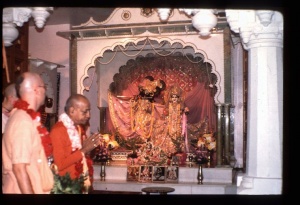SB 10.53.42-43: Difference between revisions
m (1 revision(s)) |
(Vanibot #0054 edit - transform synonyms into clickable links, which search similar occurrences) |
||
| (One intermediate revision by one other user not shown) | |||
| Line 1: | Line 1: | ||
{{info | {{info | ||
|speaker= | |speaker=Śukadeva Gosvāmī | ||
|listener=King | |listener=King Parīkṣit | ||
}} | }} | ||
[[Category:Srimad-Bhagavatam - Canto 10 Chapter 53]] | |||
[[Category:Bhagavatam Verses Spoken by Sukadeva Gosvami - Vanisource|105342]] | |||
<div style="float:left">'''[[Srimad-Bhagavatam]] - [[SB 10|Tenth Canto]] - [[SB 10.53: Krsna Kidnaps Rukmini|Chapter 53: Kṛṣṇa Kidnaps Rukmiṇī]]'''</div> | |||
<div style="float:right">[[File:Go-previous.png|link=SB 10.53.40-41]] '''[[SB 10.53.40-41]] - [[SB 10.53.44]]''' [[File:Go-next.png|link=SB 10.53.44]]</div> | |||
{{RandomImage}} | |||
{{SBnotice}} | |||
==== TEXTS 42-43 ==== | ==== TEXTS 42-43 ==== | ||
<div | <div class="verse"> | ||
nānopahāra balibhir | :nānopahāra balibhir | ||
vāramukhyāḥ sahasraśaḥ | :vāramukhyāḥ sahasraśaḥ | ||
srag-gandha-vastrābharaṇair | :srag-gandha-vastrābharaṇair | ||
dvija-patnyaḥ sv-alaṅkṛtāḥ | :dvija-patnyaḥ sv-alaṅkṛtāḥ | ||
gāyantyaś ca stuvantaś ca | |||
gāyakā vādya-vādakāḥ | :gāyantyaś ca stuvantaś ca | ||
parivārya vadhūṁ jagmuḥ | :gāyakā vādya-vādakāḥ | ||
sūta-māgadha-vandinaḥ | :parivārya vadhūṁ jagmuḥ | ||
:sūta-māgadha-vandinaḥ | |||
</div> | </div> | ||
| Line 21: | Line 27: | ||
==== SYNONYMS ==== | ==== SYNONYMS ==== | ||
<div | <div class="synonyms"> | ||
''[//vanipedia.org/wiki/Special:VaniSearch?s=nānā&tab=syno_o&ds=1 nānā]'' — various; ''[//vanipedia.org/wiki/Special:VaniSearch?s=upahāra&tab=syno_o&ds=1 upahāra]'' — with paraphernalia of worship; ''[//vanipedia.org/wiki/Special:VaniSearch?s=balibhiḥ&tab=syno_o&ds=1 balibhiḥ]'' — and presents; ''[//vanipedia.org/wiki/Special:VaniSearch?s=vāra&tab=syno_o&ds=1 vāra]-[//vanipedia.org/wiki/Special:VaniSearch?s=mukhyāḥ&tab=syno_o&ds=1 mukhyāḥ]'' — prominent courtesans; ''[//vanipedia.org/wiki/Special:VaniSearch?s=sahasraśaḥ&tab=syno_o&ds=1 sahasraśaḥ]'' — by the thousands; ''[//vanipedia.org/wiki/Special:VaniSearch?s=srak&tab=syno_o&ds=1 srak]'' — with flower garlands; ''[//vanipedia.org/wiki/Special:VaniSearch?s=gandha&tab=syno_o&ds=1 gandha]'' — fragrances; ''[//vanipedia.org/wiki/Special:VaniSearch?s=vastra&tab=syno_o&ds=1 vastra]'' — clothing; ''[//vanipedia.org/wiki/Special:VaniSearch?s=ābharaṇaiḥ&tab=syno_o&ds=1 ābharaṇaiḥ]'' — and jewelry; ''[//vanipedia.org/wiki/Special:VaniSearch?s=dvija&tab=syno_o&ds=1 dvija]'' — of ''brāhmaṇas''; ''[//vanipedia.org/wiki/Special:VaniSearch?s=patnyaḥ&tab=syno_o&ds=1 patnyaḥ]'' — the wives; ''[//vanipedia.org/wiki/Special:VaniSearch?s=sv&tab=syno_o&ds=1 sv]-[//vanipedia.org/wiki/Special:VaniSearch?s=alaṅkṛtāḥ&tab=syno_o&ds=1 alaṅkṛtāḥ]'' — well ornamented; ''[//vanipedia.org/wiki/Special:VaniSearch?s=gāyantyaḥ&tab=syno_o&ds=1 gāyantyaḥ]'' — singing; ''[//vanipedia.org/wiki/Special:VaniSearch?s=ca&tab=syno_o&ds=1 ca]'' — and; ''[//vanipedia.org/wiki/Special:VaniSearch?s=stuvantaḥ&tab=syno_o&ds=1 stuvantaḥ]'' — offering prayers; ''[//vanipedia.org/wiki/Special:VaniSearch?s=ca&tab=syno_o&ds=1 ca]'' — and; ''[//vanipedia.org/wiki/Special:VaniSearch?s=gāyakāḥ&tab=syno_o&ds=1 gāyakāḥ]'' — singers; ''[//vanipedia.org/wiki/Special:VaniSearch?s=vādya&tab=syno_o&ds=1 vādya]-[//vanipedia.org/wiki/Special:VaniSearch?s=vādakāḥ&tab=syno_o&ds=1 vādakāḥ]'' — instrumental musicians; ''[//vanipedia.org/wiki/Special:VaniSearch?s=parivārya&tab=syno_o&ds=1 parivārya]'' — accompanying; ''[//vanipedia.org/wiki/Special:VaniSearch?s=vadhūm&tab=syno_o&ds=1 vadhūm]'' — the bride; ''[//vanipedia.org/wiki/Special:VaniSearch?s=jagmuḥ&tab=syno_o&ds=1 jagmuḥ]'' — went; ''[//vanipedia.org/wiki/Special:VaniSearch?s=sūta&tab=syno_o&ds=1 sūta]'' — bards; ''[//vanipedia.org/wiki/Special:VaniSearch?s=māgadha&tab=syno_o&ds=1 māgadha]'' — chroniclers; ''[//vanipedia.org/wiki/Special:VaniSearch?s=vandinaḥ&tab=syno_o&ds=1 vandinaḥ]'' — and heralds. | |||
</div> | </div> | ||
{{SBcollapse}} | |||
==== TRANSLATION ==== | ==== TRANSLATION ==== | ||
<div | <div class="translation"> | ||
Behind the bride followed thousands of prominent courtesans bearing various offerings and presents, along with well-adorned brāhmaṇas' wives singing and reciting prayers and bearing gifts of garlands, scents, clothing and jewelry. There were also professional singers, musicians, bards, chroniclers and heralds. | Behind the bride followed thousands of prominent courtesans bearing various offerings and presents, along with well-adorned brāhmaṇas' wives singing and reciting prayers and bearing gifts of garlands, scents, clothing and jewelry. There were also professional singers, musicians, bards, chroniclers and heralds. | ||
</div> | </div> | ||
| Line 35: | Line 41: | ||
==== PURPORT ==== | ==== PURPORT ==== | ||
<div | <div class="purport"> | ||
Śrīla Viśvanātha Cakravartī explains that from her own quarters up to the temple of Bhavānī, Rukmiṇī went by palanquin and thus was easily protected. Only for the last twelve to fifteen feet, from the palace to the temple area, did she go on foot, with royal bodyguards stationed outside the temple on all sides. | Śrīla Viśvanātha Cakravartī explains that from her own quarters up to the temple of Bhavānī, Rukmiṇī went by palanquin and thus was easily protected. Only for the last twelve to fifteen feet, from the palace to the temple area, did she go on foot, with royal bodyguards stationed outside the temple on all sides. | ||
</div> | </div> | ||
__NOTOC__ | </div> | ||
</div> | |||
<div style="float:right">[[File:Go-previous.png|link=SB 10.53.40-41]] '''[[SB 10.53.40-41]] - [[SB 10.53.44]]''' [[File:Go-next.png|link=SB 10.53.44]]</div> | |||
__NOTOC__ | |||
__NOEDITSECTION__ | |||
Latest revision as of 19:25, 17 February 2024

A.C. Bhaktivedanta Swami Prabhupada
Please note: The synonyms, translation and purport of this verse were composed by disciples of Śrīla Prabhupāda
TEXTS 42-43
- nānopahāra balibhir
- vāramukhyāḥ sahasraśaḥ
- srag-gandha-vastrābharaṇair
- dvija-patnyaḥ sv-alaṅkṛtāḥ
- gāyantyaś ca stuvantaś ca
- gāyakā vādya-vādakāḥ
- parivārya vadhūṁ jagmuḥ
- sūta-māgadha-vandinaḥ
SYNONYMS
nānā — various; upahāra — with paraphernalia of worship; balibhiḥ — and presents; vāra-mukhyāḥ — prominent courtesans; sahasraśaḥ — by the thousands; srak — with flower garlands; gandha — fragrances; vastra — clothing; ābharaṇaiḥ — and jewelry; dvija — of brāhmaṇas; patnyaḥ — the wives; sv-alaṅkṛtāḥ — well ornamented; gāyantyaḥ — singing; ca — and; stuvantaḥ — offering prayers; ca — and; gāyakāḥ — singers; vādya-vādakāḥ — instrumental musicians; parivārya — accompanying; vadhūm — the bride; jagmuḥ — went; sūta — bards; māgadha — chroniclers; vandinaḥ — and heralds.
Translation and purport composed by disciples of Śrīla Prabhupāda
TRANSLATION
Behind the bride followed thousands of prominent courtesans bearing various offerings and presents, along with well-adorned brāhmaṇas' wives singing and reciting prayers and bearing gifts of garlands, scents, clothing and jewelry. There were also professional singers, musicians, bards, chroniclers and heralds.
PURPORT
Śrīla Viśvanātha Cakravartī explains that from her own quarters up to the temple of Bhavānī, Rukmiṇī went by palanquin and thus was easily protected. Only for the last twelve to fifteen feet, from the palace to the temple area, did she go on foot, with royal bodyguards stationed outside the temple on all sides.